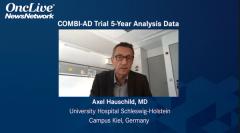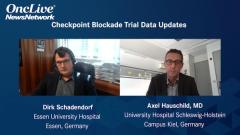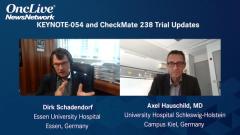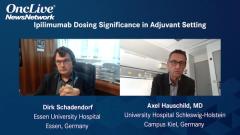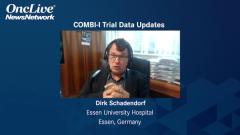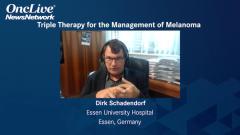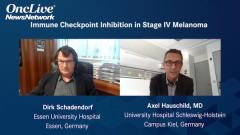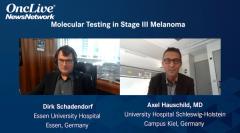
Ipilimumab Dosing Significance in Adjuvant Setting
Episodes in this series

Transcript:
Axel Hauschild, MD:If you don’t have a good explanation, may I ask you a question, Dirk? What role is the 10 mg/kg playing for ipilimumab? Because the trial you mentioned, the CheckMate 064, was using a conventional dose, which is 3 mg. Is ipilimumab high dose better than ipilimumab low dose? We know it’s not approved and there was a trial comparing 3 and 10 mg/kg in the stage IV setting.
Dirk Schadendorf, MD:The role of ipilimumab will become more intentional over the next years. As you have mentioned, there is an old study that has just reported 5-year overall survival data comparing 3 and 10 mg, and we have seen already a survival difference already in favor of that higher dosage. There is even an almost ancient trial that tested not only 1, 3, and 10 mg, but I think 0.1 mg as well, which is more than 10 years old, also demonstrating a dose-dependent effect of ipilimumab. Obviously, increasing the dose of ipilimumab is not only increasing toxicity—what we are focusing on also in various other tumor diseases—but also inflammation and possibly also clinical effects. This is something we need to take into consideration, not only for the metastatic setting but also in the adjuvant setting. In the neoadjuvant setting, we have 1 mg of ipilimumab, which is probably going to be established and used in the future. We have 1 mg with even longer treatment intervals in CheckMate 915, which is currently being tested. For toxicity reasons, that’s probably the right decision. For efficacy reasons, that’s still an open question.
Axel Hauschild, MD: I completely agree, Dirk. Would you agree with my following conclusion on the adjuvant part? The PD-1 antibodies are equally effective in the adjuvant setting, and they are also equally effective to dabrafenib and trametinib. The toxicity pattern is completely different—different toxicities, different grades—and the treatment discontinuation rates for dabrafenib-trametinib appears to be higher, but both of them showed efficacy of 50% improvement of relapse-free survival, distant metastases-free survival improvement. For dabrafenib-trametinib, there is an overall survival improvement over placebo. We need to say that ipilimumab is not a placebo in the adjuvant setting. It’s an active drug.
Dirk Schadendorf, MD:Absolutely. There are 2 aspects I would like to add. No. 1 is the potential of the reversibility of adverse effects. There is a small subset of patients who are receiving adjuvant treatment, and this will become even more relevant if we move to stage IV, who will have irreversible, mostly endocrine toxicities that need substitution. If the number of patients to be treated in order to benefit is increasing, then this is becoming relevant in the benefit discussion for the patient. This is No. 1. No. 2, I would like to add, is also the kinetics of relapse, which is different between checkpoint blockade and targeted therapy in stage III adjuvant disease management. With targeted therapy we are confident that as long as the patient is on treatment for this 1 year, the relapses are very small. But as soon as you stop, the majority of the relapses will occur within 6 to 18 months. For the checkpoint blockade, for pembrolizumab and nivolumab in the stage III disease, 25% of the relapses that occur over the first 4 years will occur while on treatment, within this first treatment year. That’s important to keep in mind. To select the right treatment your patients, you have to discuss it.
Transcript Edited for Clarity


